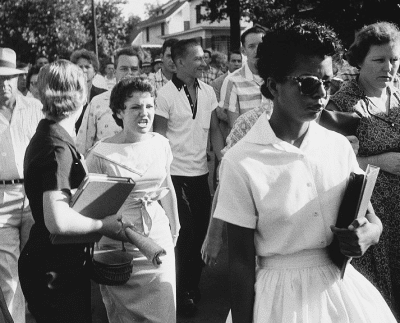.
.
The Sunday Poem is published weekly, and strives to include the poet reading their work.
Laura Trigg reads her poem at its conclusion.
.
.
___
.
.
AP photo via Wikimedia Commons

Elizabeth Eckford being jeered by white student Hazel Bryan as she attempts to enter Little Rock Central High School; September 4, 1957
.
___
.
Sticks and Stones
The shadow from the brick facade
of Central High School did not seem
to spread much shade on the streets
of our Little Rock neighborhood.
I was learning to read, ride a bike,
and chase my brother around the yard.
Mother, from her standard position
behind the pink formica counter
in a tiny galley kitchen,
would tell us what to say
if we encountered playground meanness.
“Sticks and stones may break my bones,
but words will never hurt me.”
We watched cartoons and ate Campbell’s soup
not knowing that during that time,
Charles Mingus was writing “Fables of Faubus”
about the attempt of the Arkansas governor
to stop racial integration of the high school
by calling out the National Guard.
Mingus’ record label would only release
an instrumental version, so he recorded
the song with vocals on another label.
In performances, the song stretched
itself to over thirty minutes and included
snippets of “Yankee Doodle Dandy”, “Dixie”,
and “Shortnin’ Bread” as Mingus initiated
a call and response with his drummer,
Dannie Richmond.
My brother and I spent our teens
waiting for the next rock band to come
to Barton Colosseum on the state fairgrounds.
We never heard of Mingus or his Little Rock song
until jazz started seeping around the edges
of our favorite rock bands in our twenties.
“Name someone who is ridiculous, Dannie.”
“Governor Faubus.”
“Name me a handful that’s ridiculous, Dannie Richmond.”
“Faubus, Rockefeller, Eisenhower.”
“Why are they so sick and ridiculous?”
“Two, four, six, eight.
They brainwash and teach you hate.”
“H-E-L-L-O, Hello.”
.
Listen to Laura Trigg read her poem
.
.
___
.
.
Laura Trigg is a retired physician, jazz and blues fan of many years, and amateur poet. Her poems are influenced by the music and culture of the American South.
.
.
Listen to the 1960 recording of Charles Mingus performing “Fables of Faubus,” with Eric Dolphy (saxophone); Ted Curson (trumpet); Dannie Richmond (drums). [Candid Productions]
.
.
___
.
.
Click here to read previous editions of The Sunday Poem
Click here for information about how to submit your poetry or short fiction
Click here to subscribe to the (free) Jerry Jazz Musician quarterly newsletter
Click here to help support the ongoing publication of Jerry Jazz Musician, and to keep it commercial-free (thank you!)
.
___
.
Jerry Jazz Musician…human produced (and AI-free) since 1999
.
.
.








































